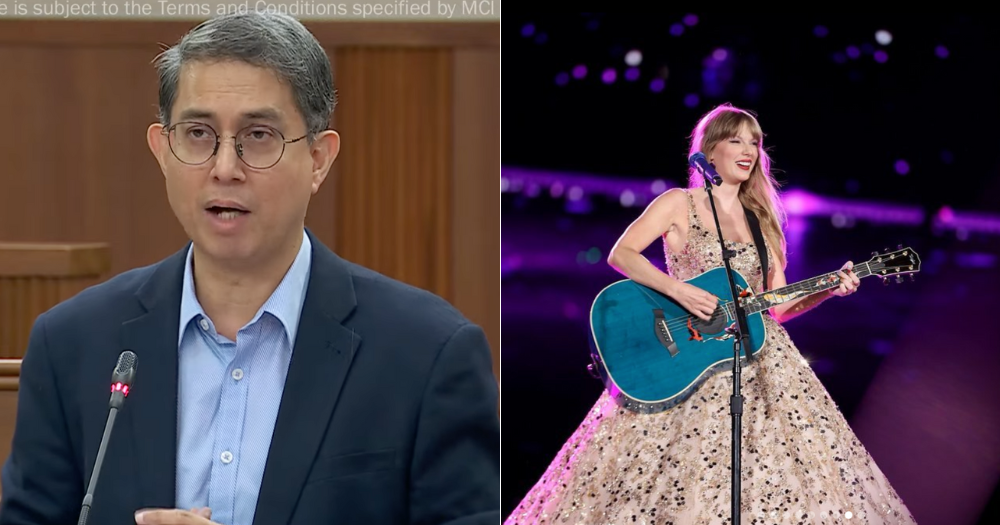Minister of State for Home Affairs Muhammad Faishal Ibrahim revealed in Parliament on Aug. 2, 2023, that the total estimated loss in concert in concert ticket scams in 2023 as of Jul. 10 is S$518,000.
This was compared to the S$84,000 lost in 2018 and S$175,000 in 2022.
People's Action Party (PAP) Member of Parliament (MP) Desmond Choo's query on how the Ministry for Home Affairs will enhance measures to mitigate against scams on the purchase and reselling of tickets.
He explained that while MHA would be working on a multi-faceted approach to combat the scam, such as blocking scam content and enhancing the safeguards on digital platforms, he urged the public to adopt precautionary measures.
"Ultimately, the best defence against scams is a discerning public," Faishal concluded.
Increase in scams involving concert tickets
In July 2023, the Singapore Police Force (SPF) shared that at least 54 victims lost more than S$45,000 to scammers in less than a week after they tried to buy scalped concert tickets to Taylor Swift's The Eras Tour Singapore.
According to the police's weekly scams update on Jul. 14, 2023, e-commerce scams, including concert ticket scams, made it to the top five list of scams of concern when they did not make the list the week before.
The police shared their concern with the resurgence of concert ticket sales scams, with more artists performing in Singapore in 2023 and 2024.
SPF added that Twitter was the most common platform for victims falling prey to Taylor Swift concert ticket scams.
Other platforms scammers use are Carousell, Xiaohongshu, Telegram and Facebook.
One woman in Singapore was scammed into buying two Taylor Swift tickets for S$ 700 from a Carousell scalper, where the woman transferred the money to the seller but did not get her tickets or even a reply from the seller.
Another Malaysian engineer was scammed S$3,320 after being scammed into buying tickets for Taylor Swift's concert in Singapore.
After transferring the money to the scammer, he could not contact the seller to claim his purchased tickets.
SPF working closely with social media and e-commerce platforms to take down scam advertisements
Faishal shared in Parliament that victims come across advertisements for concert tickets on e-commerce websites or social media platforms, such as Carousell, Facebook, Telegram, and Twitter.
The victims will then approach the scammers to purchase the concert tickets, and scammers would often claim that the tickets are selling fast, pressuring the victims into making payments quickly. Once the scammers receive the payments, they claim they cannot transfer the tickets to the victim and become uncontactable. For some victims, victims may receive their tickets via email or WhatsApp only to find out on the concert day that the tickets are invalid.
As such, SPF will work closely with social media and e-commerce platforms to take down scam advertisements for concert tickets and accounts involved in such scams as soon as they are detected.
In addition, SPF will also be working with the platforms to prevent such scams from happening through pre-emptive detection and blocking of scam accounts.
Raise awareness of concern ticket scams
To raise awareness regarding concert ticket scams, SPF partnered with ticket retailers, concert organisers and online platforms to issue advisories to the public.
One example is that SingPost displayed such advisories on digital screens in their outlets so that people queuing at them could see them.
Ticketmaster placed similar advisories on their website.
E-commerce Marketplace Transaction Safety Ratings
The Inter-Ministry Committee on Scams launched the E-commerce Marketplace Transaction Safety Ratings (TSR) in May 2022, informing consumers of the anti-scam measures that major e-commerce marketplaces have in place.
Faishal encourages consumers to purchase only from marketplaces with better ratings.
He raised the example of Facebook Marketplace, which he said is rated the worst in the TSR as they have not implemented recommended safeguards despite repeated engagements. In comparison, Shopee and Carousell have stepped up their measures.
Faishal also pointed out that the Ministry of Home Affairs passed the Online Criminal Harms Act in July 2023, allowing the Government to issue Directions to online platforms to disable online criminal content and activities, including scam-related ones.
"Ultimately, the best defence against scams is a discerning public," Faishal emphasised.
MHA's tips for the public
Faishal urges the public to adopt precautionary measures through the three simple steps of “Add”, “Check”, and “Tell”:
First, “ADD” the ScamShield App, anti-virus software, and other security features, such as multifactor authentication for digital accounts and transaction limits for internet banking. When transacting online, use secured payment options, and never take transactions or payments off-platform;
Second, “CHECK” the seller's reviews and look for potential red flags when purchasing online. For concert tickets, only purchase from authorised sellers and legitimate resellers, such as Ticketmaster. Where possible, arrange for a physical meet-up with the seller to verify the authenticity of the tickets before making payment.
Third, “TELL” your family and friends about scam encounters, and report fraudulent advertisements to social media and e-commerce platforms and the authorities.
Related stories
If you like what you read, follow us on Facebook, Instagram, Twitter and Telegram to get the latest updates.



